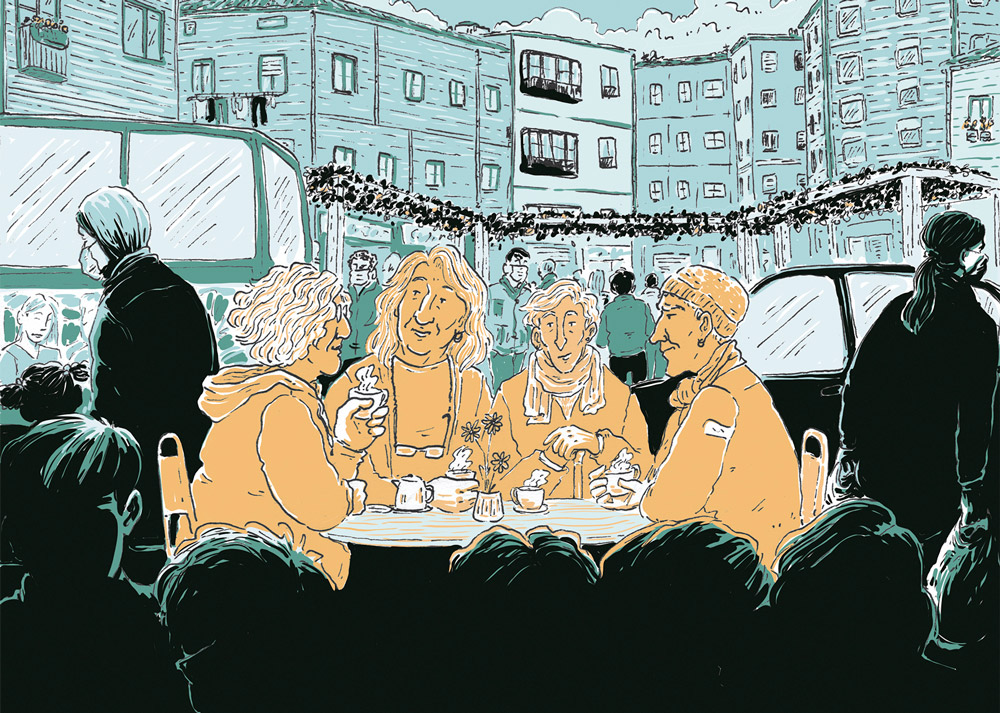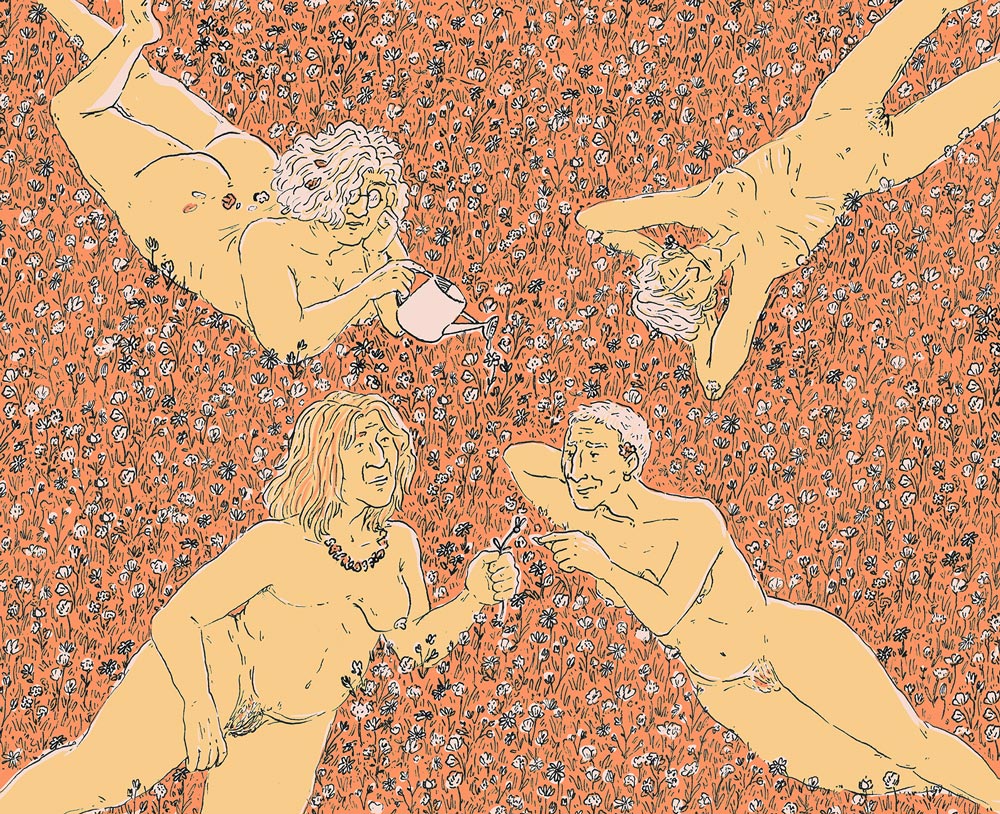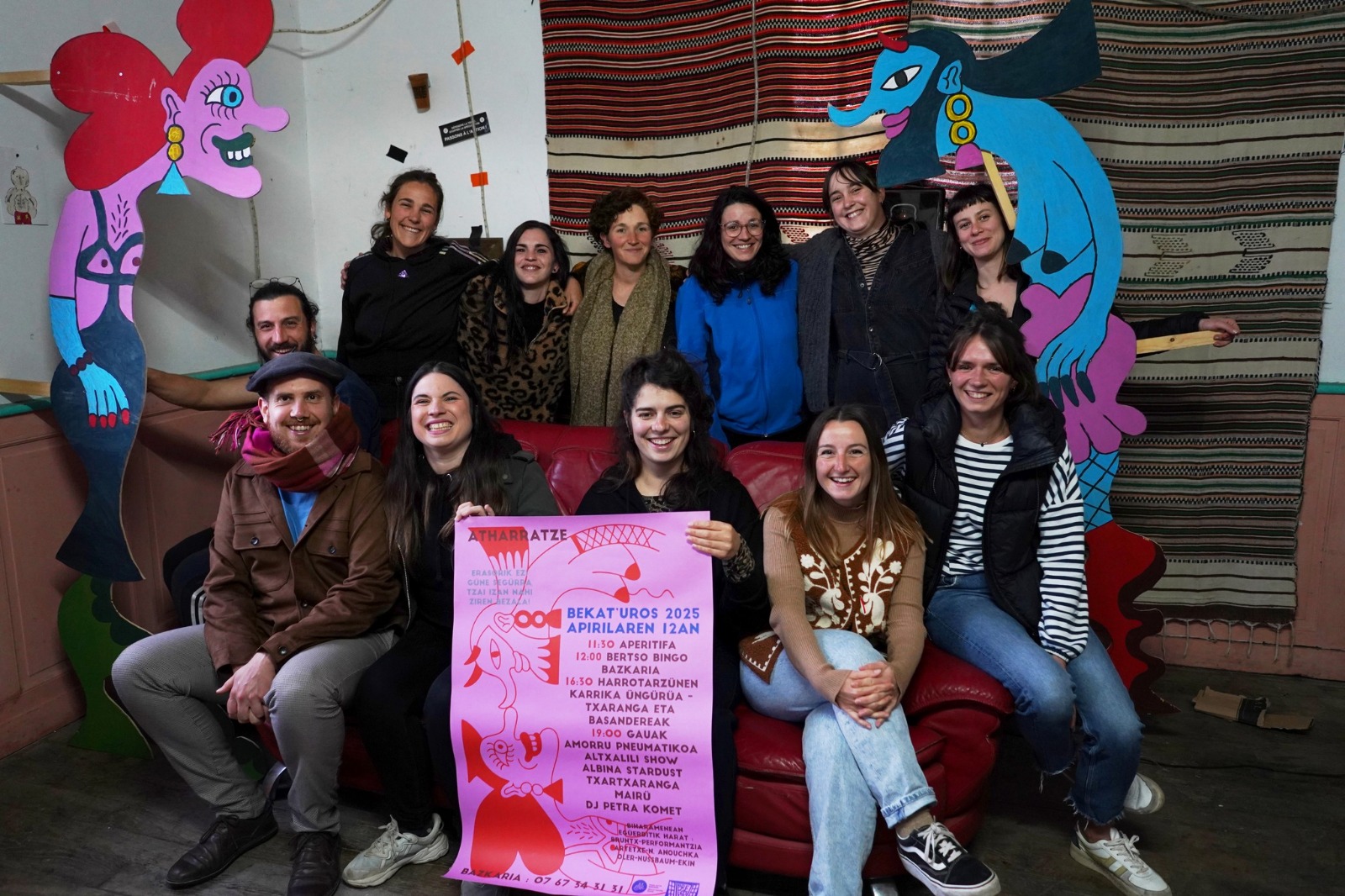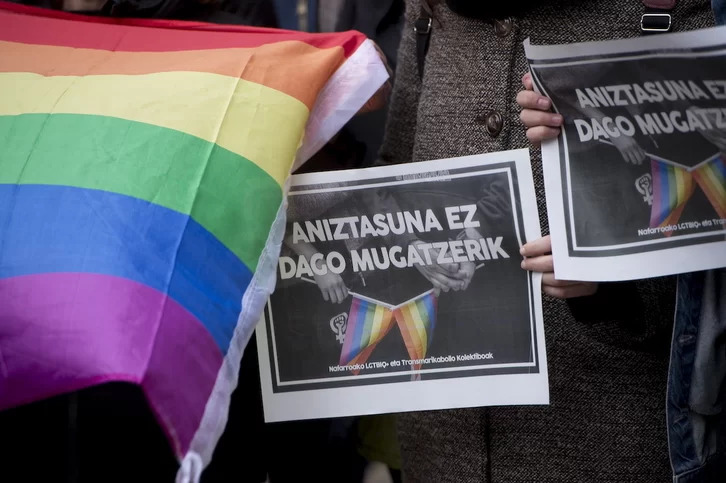Tertulia on the body and sexuality of older women
- The body and sexuality form a complex mataza that intertwines, which can have as many strings as people and as many knots as experiences. Let's not say if the voices of women aged 58 to 77 testify to us. So we've gathered four women around the table to bring out what they don't talk to each other, but above all to mark a milestone for the first time.

Nervous, tense and enthusiastic come to the quote of today’s protagonists with the journalist. The four have acknowledged that the proposal was affirmed “downwards” more quickly than expected and that in the following days they were thinking: “What am I going to have to talk about that?” they asked one by one. But they have something to do with it. They are Josune, Arantxa, Itziar and Nekane. The four ask for invented names, arguing that these kinds of issues still generate only a “morbo” and a “gossip”. They are 58, 68, 77 and 68 years old, respectively, and live in the same town. They are known and happy to work on the subject in the area, as they hardly have the opportunity to speak calmly with family or friends in the area. “I have managed to create an environment of trust with some friends. With my mother, on the other hand, I never got, they were other times, and now also with my daughter, despite trying, I have felt that I am heavy and that I don’t have to talk about sexuality with her,” says Josune. Nekane agrees that in society in general there is a “certain kind of reluctance” to talk about sexuality, even today. Itziar says yes, noting that conversations can be considered “prostitutes” and with whom to start. Arantxa, both for his time and for the experiences that have touched him to live, has never found the right accomplice to vent. “What I’ve talked about has always been a joke. If you’re not very close to other older women, it’s very difficult to get these kinds of issues on the table.”
“At that time everything was sin.” That is what Nekane says by referring to youth. Franco's dictatorship, the imposition of the Catholic religion and the strict view of society, greatly limited the first contact with the body, both in relation to masturbation and menstruation. Josune perfectly remembers how her mother repeated her masturbation and that the “like” were not issues that corresponded to a girl like her, but to the “swine”. The other three say that in their homes the answer was the same. At 13 years old, Itziar turned around the palet of sin and began to masturbate: “This does not harm anyone, so it cannot be a sin! I said it to myself. However, I was always concerned and afraid. The persecution was terrible and even though I didn’t hurt, I wasn’t completely calm.” Nekane had a lot of internal struggles in these times; when he believed masturbation was a sin, he wanted to bring his hand back to his leg as soon as he went to confession to the priest and leave there: “He said to me: This is the picture! I’m willing to step out of confession and sin again.” Despite being a boyfriend, he does not remember these years tenderly, as he had to hide and lie with his parents and relatives.
They say that the relationship with the rule was worse than they wanted, especially Arantxa. “Nobody explained to me what it was. I went from school home without knowing what was happening to me.” Then she lived with an aunt and she did not know how to improve the situation, as she remained silent before a teenager frightened by the bloodshed: “I spent three days crying in bed with trauma.” The messages of the “normal” came to him later. He believes that the fact that theirs are clergy and never talking to his friends of menstruation had a direct influence.

Absence of freedom without protection
Once the adolescence was abandoned, the situation did not change very much to the diners. Itziar lived in Bilbao during his university studies. He says that he “broke all rules and frameworks” because he revolutionized society politically and sexually in May 1968 in France. “We broke all the taboos.” Despite sexual liberation, he says that fear persisted in the body, as without contraceptives there was no possibility of “enjoying anything.” Through a friend she got an appointment with the gynecologist, who came with her boyfriend to ask them to give them pills for this interval because they were not able to marry because they were studying. They got them, but they didn't benefit him in the belly and he had to leave them.
Nekane has also not had good experience with contraception. She got married at the age of 24, had two children and after the second began to meditate. He says he had no desire, no desire to hit his skin. Here's the paradox. “Take birth control to prevent pregnancy, but don’t want it. If I didn’t catch them, the risk was there and, of course, fear.” She also says that sexual desire and desire also depend on the partner or person at each moment, and the others coincide. Mutual knowledge, knowledge of what the other likes and communication among them have been considered basic: “It’s not what you do, but with whom you do it,” adds Nekane. Arantxa had a boyfriend for ten years, but he didn't know orgasm until he lay for the first time with a woman: “A new world opened to me. I was with a kid because that's how I played. Until I realized that I had a party with boys!” In addition to the first time, he says that he has done very well in the relations he has followed, and he has the feeling that his wishes have been taken into account.
Itziar: "It's very different whether men are mentalized in feminism or not. Sexual relations are more egalitarian"
Josune and Nekane have slept only with men, Itziar had an experience with a woman, “very special” and “pretty” in her words, but in the rest she has had male lovers. A friend of Josune told her that only men could have orgasms. The idea seems crazy, but Nekane and Itziar claim it was a widespread belief. The latter says that there is a “terrible” myth about female orgasm, and that it should not be directed to everyone: "Orgasm does, of course it does! Of course we are able to have a terrible pleasure, but it seems that you always have to get there, and it is not! Without that you can also have a great time and you can feel a huge pleasure.” Yes, it is clear what is the key to that path: “You have to have your head loose, without fear and without feeling that you are sinning!”
Have they suffered power relations with men? As he launches the question, Josune hands on the hook: “You have to pay attention to men, it’s true. In sex, you notice how we are: after all, sex is a journey, a journey to find another person, and on that path you see what each one looks like. In my case I have had experiences where she was only going to her, regardless of my wishes. On the contrary, other times I’ve connected it and it’s been beautiful.” Itziar believes that the basis lies in ideology: “In sex, it’s very different whether men are mentalized in feminism or not. Relationships are more egalitarian.” The four say that love also influences, that it is not the same to be in love as to “have fun” at a certain time with a acquaintance or friend. They also believe that the importance given to love is a consequence of the education received, with care, romantic love and the interiorization from childhood of ideas related to the house. Josune revolutionized thought through studies and has understood that we are not monogamous, that love is a cultural construction. “These ideas have helped me a lot, but at the same time I have internalized that for a woman love and sex are related.”
Essential change of the body
It is difficult to date the beginning of old age, to know when or where each would place his or her awareness of having begun to age. They agree that menopause would be one of those moments. Nekane felt emotional pain in the first few months, “a kind of sadness,” the void of having lost something. “People sold me everything as if it was good, but I didn’t live like this: until then I was always ready to make plans and menopause took my heart off.” Josune finds a good travel partner, an expert who relieved him of the transition. However, he recognizes that the body is a period of great change and that in his case, as he touched him in the midst of love history, he held his passion for sex firmly. But eight years later, today, it lives differently. “The drought in Aluko also influences. You feel pain and that makes you want.” Arantxa says yes with her head, that her libido has also been greatly reduced, but that if there were any suitable interlocutor she would be perfectly fixed. Nekane, on the other hand, becomes very strong and, sometimes, even if he doesn’t like it, masturbates with “this I can’t sleep.”

The lack of vitality of the body alerted Itziar that the years do not forgive: “From the age of 60, I felt tired more than before and I just had to slow down the frenzied life between hours.” Despite this, the machine has become an element that makes it feel “alive”. Arantxa adds that many people think that once they are 65 years old, they have to take a “break” and that they have to leave their duties until then: on the contrary, the four say that moving from being on the front line to leaving the playing field is a decay. Nekane says he meets the coffee or tranquillity of his house with some acquaintances of his surroundings, but that is not his case. “Being here like today makes your head go, and that’s a beautiful thing.” The group of pensioners is one of them.
Nekane when he was 35 years old felt that time was going to happen when he was on the bridge between youth and old age: “I thought I couldn’t extend my youth much longer, which was a time when it was a time.” Once the idea was internalized, he states that he has learned to be in agreement with the decisions made, to value the punctual. Basically, he wants to feel at ease when it comes to taking stock in a few years' time. “Starting at age 65, I don’t think we’re here to waste time.” Unlike others, Josune associates old age with pain. He feels bone pain and although it may be related to age, he says that other factors will also have to do with it, he considers it “artificial” to set the exact date.
Josune: "I never got with my mother and now also with my daughter, despite trying, I've felt that I'm heavy and I don't have to talk about sexuality with her."
Life and arrival
However, the years have also given them peace of mind and recognition, as the time takes as long as it has been taken away. Nekane insists that it has become possible to become “more irreverent”, as it is clearer who wants to be a person next door and says what you think faster. Josune relates the idea to expectations, as the dreams of youth are blurred as they get older. “You recognize that life is not the one you imagined, but the one that shows you reality.” For the same reason they have underlined the need to learn how to manage frustration, to recognize that many things they had thought of in the past were “nonsense” and that they were not worth it. “Models and referents also change you. You realize that we often had prisons in mind and that this is not the best way to live.” He mentioned Itziar’s personality and that it is largely due to feminism what has been learned along the way: “It was Franco’s times, it was in politics, in the children’s world, and normally it used to be a woman. I saw women vulnerable. Then I realized that I was a male chauvinist and when I got into feminism all my life I got on my feet: it has given me personality, security, trust and many things.”
They are 58, 68, 77 and 68 years old and, as Nekane has pointed out, now they think more about death than before. Arantxa accepts that he is afraid of him, that he thinks about the moment between the present and the future. That he is anxious, but that when he is proud of what he has experienced, he feels serenity immediately. Itziar and Nekane care more about living conditions than about death. They are now healthy and, despite the fact that the law of euthanasia has given them hope, they are living with concern the question of care: “The current system must be revolutionized.” At home, you'd like to spend the last few years, but you're aware that maybe it can't be that way. They advocate for the working conditions of workers in nursing homes and say that the slavery of migrant women performing household care must be ended. They consider it necessary to create new care models. Josune has put the last point in the afternoon, with a phrase that is worth remembering: “Death makes life habitable.”
Errepikatu nirekin: Sara Millerey. Ez dezagun ahaztu bere izena. Transfeminizidioaren biktima da Millerey: gorrototzaile transmisogino batek torturatu zuen, besoak moztu zizkion eta bizirik bota zuen ibaiertz batera. Bi orduko agoniaren ondoren hil zen.
Errazagoa da J.K... [+]
Transfeminism has brought clarity and complexity to discussions about bodies, genders and desires. It also created shadows. In the name of a supposed radical political coherence – often linked to a very specific hegemony – some transfeminist discourses reproduce logics of... [+]
The Leioa School of Education was full of students last Wednesday because Samantha Hudson was coming. She is a transgender Mallorcan artist, singer and influencer born in 1999. The star of the People Singing Encounters had an endless line to give selfies and autographs, and his... [+]
Bilbo, 1954. Hiriko Alfer eta Gaizkileen Auzitegia homosexualen aurka jazartzen hasi zen, erregimen frankistak izen bereko legea (Ley de Vagos y Maleantes, 1933) espresuki horretarako egokitu ondoren. Frankismoak homosexualen aurka egiten zuen lehenago ere, eta 1970ean legea... [+]
"Pornografiaren aurrean nola esku hartu. IKTen erabilera nerabeen eta gazteen sexualitateen arretan: errealitateak eta aukerak" ikastaroa emango du Ane Ortiz Ballesterosek (1989, Bilbo). Sexologoa da bera, Training sexologia klinikoan, Genero Berdintasun Teknikaria eta... [+]
1984an ‘Bizitza Nola Badoan’ lehen poema liburua (Maiatz) argitaratu zuenetik hainbat poema-liburu, narrazio eta eleberri argitaratu ditu Itxaro Borda idazleak. 2024an argitaratu zuen azken lana, ‘Itzalen tektonika’ (SUSA), eta egunero zutabea idazten du... [+]
La bajona kolektibo kide Heiko Elbirak salatu du psikiatriak zisheteroarautik aldentzen diren erotikak kontrolatu nahi dituela.
























